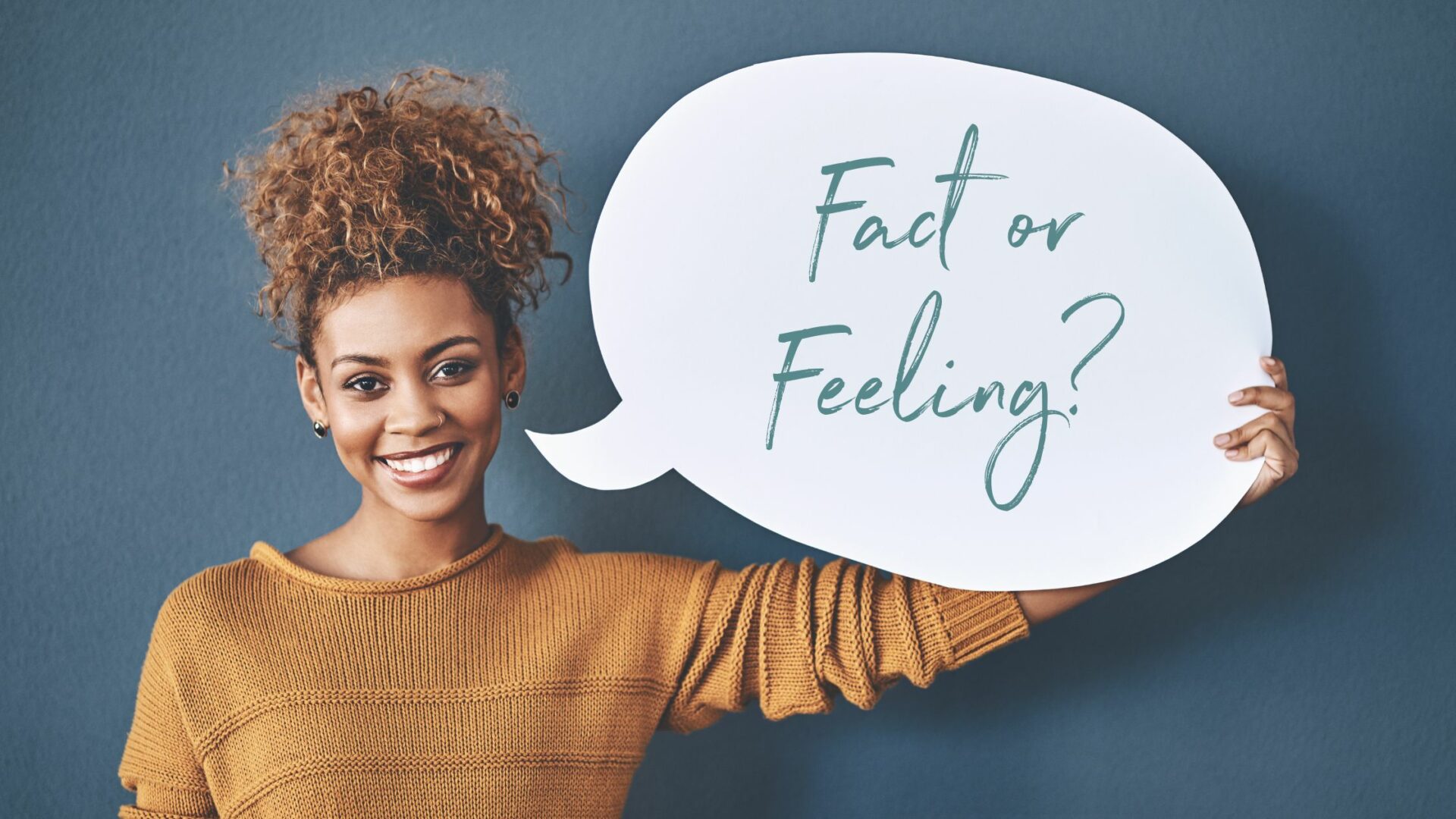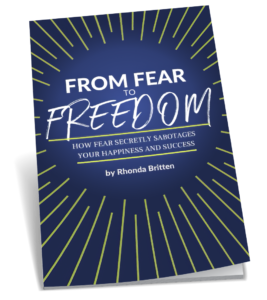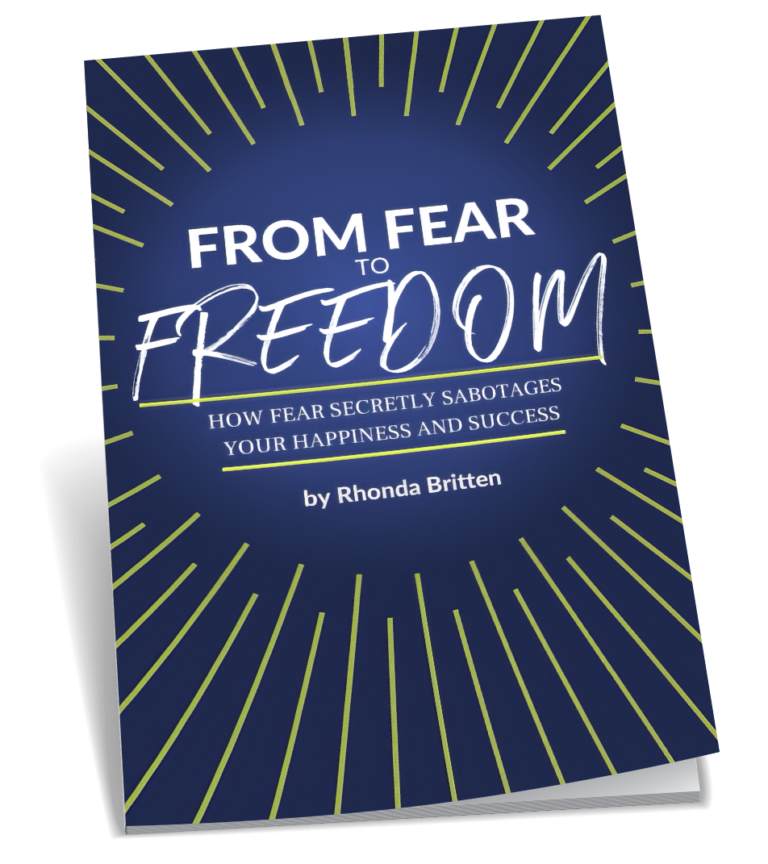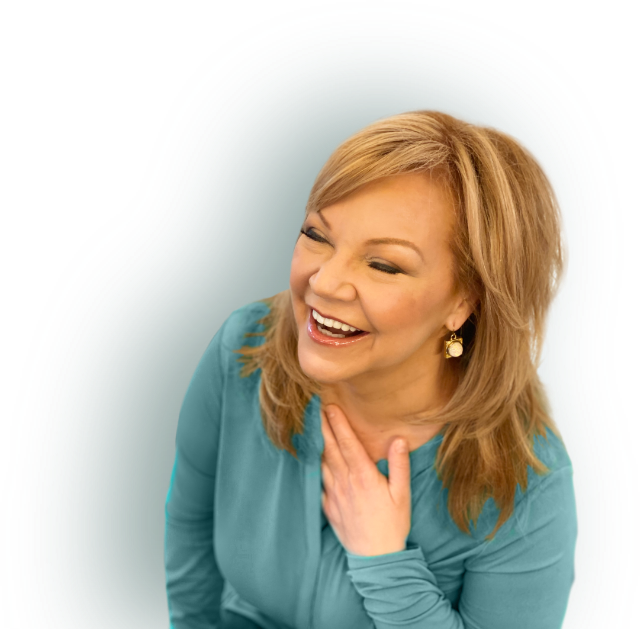Today we’re going to discuss a topic that can cause some folks to cringe or give me a big ol’ eye roll—Feelings. But trust me, what I’m going to share with you is going to provide you some relief, support, and a way out of those feelings that aren’t exactly pleasant.
Specifically, we’re going to dig into how fear tricks you into ignoring the facts and how you can use one little question to fight back against the hold that fear has over you.
Facts and feelings get jumbled in our brains all the time. Sometimes we feel something so strongly that we just know it’s true. But do we actually know? Do we have proof?
Thoughts like,
“I’m not good enough.”
“No one likes me.”
“I’m a failure.”
“I will never accomplish my goals.”

We may feel these thoughts and believe them to be true deep inside our very being, but they aren’t actually grounded in the truth with a capital T. They are fabricated by fear. I know it doesn’t feel that way. And I’m sure you have loads of examples to prove those feelings you have about yourself are indeed facts, yet, stay with me until the end, and I promise it will all make sense.
Because feelings stemming from fear are very powerful, and they can also become dangerous when we ignore them instead of identifying their source.
For example, it’s so easy to get focused on appearing strong that we do absolutely everything we can to ignore our very real, natural feelings. This happens when we interpret “strong” as being our desired state and cut off anything that doesn’t feel, well, strong.
But we all feel sad, angry, irritated, distraught, foolish, etc. And as human beings, it’s required to feel all those feelings in order to embrace all of who we are, even if those feelings are unwanted, unpleasant, and so-called negative.
Ignoring your authentic feelings only bottles them up and pushes them down deep inside you until, one day, you feel like you’re going to explode. (Boy, do I have stories about my explosions pre-Fearless Living. Geez!)
Feelings are complicated, to say the least.
Are Feelings or Facts More Important?
It’s a good question: Are feelings or facts more important? Well, they’re both important! Our feelings are generated by how we filter the world through things like our beliefs, values, desires, needs, and, yes, our fears. Most folks believe they ARE their feelings. Yet, we are so much more than our feelings.
So do feelings matter? Heck, yes. Do we want to honor our feelings? Heck, yes. But do we want our feelings to be the criteria we use to make all of our decisions? Heck, no.
Imagine for a moment that your feelings are like a barometer indicating whether there are storms ahead or clear sailing.
A barometer doesn’t create the weather, but it indicates what’s happening in the environment. That’s the same as feelings. Your feelings are letting you know what’s happening within you based on what’s happening around you or what thoughts you’ve allowed to take up residency in your body and brain.
That’s why when we avoid expressing our feelings or pretend they don’t exist (i.e., ignore the barometer), they seem to bottle up, and we end up exploding (blaming the world) or imploding (shaming ourselves).
When you avoid and deny what you’re feeling, you’re actually denying your very existence and refusing to honor your own internal process.
So yes, all of our feelings are valuable, and even if we don’t want them to be, they are very real. When you avoid your feelings, you’re unable to learn from them. There is a reason you’re feeling sad, angry, ashamed, judged, resentful, foolish, etc.
Sometimes that reason is fear. When fear kicks in, fear can trick you into creating thoughts and feelings that disempower you and discredit all of your hard work. This is when it’s imperative to take a step back, take a deep breath, and center yourself in facts and not buy into the false narrative created by fear. You’ll never be free from fear if you continue to allow it to hijack your state of mind, forcing you to deny your true, authentic feelings.
Here’s the truth: Your authentic feelings are the way out of any problem you’re experiencing. Allowing yourself to feel your true, authentic feelings is the first step toward honoring yourself.
I get that it may be hard. There are so many feelings we don’t want to feel—painful feelings, destructive feelings, annoying feelings, what have you. Those feelings can seem to have you by the throat and, if you’re like me, they can make you feel crazy, stupid, anxious, and so on.
But let me put it this way: “The feeling that you’re afraid to feel is running your life.”
You will continue to be stuck, and you will continue to be ruled by fear, if you’re not willing to feel your feelings and work through them. Honoring your feelings, owning them, and moving through them is what will lead you from fear to freedom.
No matter how tough it is (and I can tell you right now, it will be tough at times), in order to find Fearless Freedom, you must accept your feelings, all of them. You don’t have to act on them, and many times it’s better not to. Your job is simply to embrace them and learn from them.
I have A LOT to say about owning your feelings—too much to fit into this article! I'll cover Expressing Feelings (Through Venting) in a future article.
So yes, we must listen to our feelings. We must claim them. BUT we should not always act on them or believe them to be fact. By sitting with your feelings and listening to their message, you can begin to understand what’s causing you to feel the way you do.
It might be an unmet need, the denial of a dream, or a desire to expand your heart. There are so many reasons you might be feeling the way you do. Your job is to get curious about how you process pain, joy, success, failure, etc.
Facts and feelings are both important. They work together to help you determine your truth. So, how do you tell the difference between facts and feelings, and what tools can you use to work through them? I’ll answer both of those questions next.
Are Feelings Based on Facts?
Feelings can definitely be based on facts. So why do people say feelings aren't facts?
Many feelings are manufactured from illusionary facts that we decide are true but have no basis in reality. But that doesn’t make the feeling false.
Let’s get something straight, all feelings feel real. This is why we honor ALL feelings.
Yet, there are many folks out there who are so trapped in fear they believe feelings aren’t real. In these people’s minds, feelings are all abstract. Feelings are a sign of weakness, and there’s no value in listening to them. Has fear ever made you feel this way? Do you know someone in your life who constantly denies their feelings?
At Fearless Living, we know that all feelings have value. All feelings must be honored, but not necessarily acted on. Every feeling guides us toward a greater awareness of who we are.
However, a lot of feelings aren’t based on facts. These feelings are misleading, as they are guided and generated by our fear.
I bet you can relate to this. You’re in the mall. You walk into a store to buy some clothes. A couple of people inside glance your way or, at least, you think they do. And immediately, inexplicably, you assume they are judging you. They think you’re too fat or too skinny or too tall or don’t have the right skin color or don’t have enough money to shop there. All of a sudden, you’re convinced they think you don’t belong. So then you feel like you don’t belong.
But in truth, the facts are likely far from that. People are more concerned about themselves than you. It’s possible and even probable that one or two of the people in that store just had the exact same feeling as you. They looked at you, maybe caught your eye for a second, and they immediately started feeling insecure about the same things! “Oh, that woman noticed the stain on my shirt. She thinks I never do laundry. She thinks I’m poor. I should just leave.”
These feelings feel very real—because they are. Fear is real, and it’s an incredibly powerful force. But these emotional fears, the ones we speak about at Fearless Living—like Fear of Failure, Fear of Not Being Good Enough, Fear of Loneliness, and so much more—are rarely based on facts. They come from past trauma and deep-seated insecurities. It may be a fact that you were bullied growing up about your weight, height, dimples, and what have you, but that doesn’t mean that everyone everywhere shares the opinion the bully had.
Our feelings are powerful, especially when they’re based on fear. It’s important to claim our feelings so that we can understand them and where they’re coming from. But since not all feelings are based on facts, and fear often hijacks our feelings, how can you tell the difference between a feeling and a fact?
Let’s dig into it!
Fearbuster Exercise™ — “Am I making it up, or is it a fact?”

I love, love, love this exercise, and I personally use it all the time—sometimes on a daily basis. It helps to ground me in reality whenever fear sends me spiraling or when fear is being sneaky by filling me with excuses.
When negative, fearful feelings start to surge through your stomach, heart, mind, and soul, take a deep breath and ask yourself this simple question: “Am I making it up, or is it a fact?”
Let’s say your friend just canceled plans with you or forgot to call you back. Now, your mind might go straight to, “Are they mad at me? Have I done something to bother them? Why do they hate me all of a sudden?”
Ask yourself, “Am I making it up, or is it a fact?”
Could there be another explanation for why they canceled, one that has absolutely nothing to do with you? For example, their children, their career, their spouse, the weather, or maybe they simply have tummy trouble? Are there any facts to back up your feeling that they all of a sudden dislike you?
I recently worked with a client, Kelly, who was having a really hard time at work. When I asked Kelly what she was struggling with, she said, “Rhonda, my boss hates me.” I said, “Kelly, hold on a second. Are you making it up, or is it a fact? How do you know your boss hates you? What proof do you have? Did she say she hates you? Did a coworker tell you that your boss doesn’t like you?”
Her reply? “Well, Rhonda, I can just tell. I know she doesn’t like me.”
So, I’d ask again, “Are you making it up, or is it a fact?”
And guess what? Kelly didn’t have any proof her boss hated her. Her proof came down to a feeling she had, and that feeling was so strong that it was all the proof she needed.
You see, when we don’t have all the facts, our brain doesn’t like it. We don’t like the unknown—we’re often terrified by it. So without all of the facts, your brain makes something up to fill in the gaps. It does this out of a neurological need for safety. Your brain will join up with fear because it wants to keep you safe at all costs. Something, anything, is better than that scary unknown.
I asked Kelly to try something else instead. What if she imagined that her boss really liked her? How would that change their relationship? What would that mean for her own wellbeing at work?
When you find yourself going down the route of believing someone doesn't like you, something is against you, or you can’t do something for X reason, stop yourself right there.
It’s time to ask: Am I making it up, or is it a fact?
Let’s talk about some other scenarios where this little question comes in handy.
Let’s say you get a bad review of something you created—a book, artistic piece, meal, anything. Fear might convince you to overvalue that one review, ignoring all of the positive ones. You might start to think, “Oh, no. I’ve actually failed. I’m a failure.” Or, “What did I think I was doing trying to make something? I’m a fraud.” And all of these defeating thoughts, based on one small, insignificant review, are altering your perception of everything.
Now, let’s pull out our magical little question: Am I making it up, or is it a fact?
If you take a step back from the Wheel of Fear you’re on and look at the facts, what do they tell you? Have lots of people given you negative reviews? Do you have more bad reviews than good reviews? How do all of your good reviews make you feel? Do you believe those reviews are authentic and valuable too?
Now, what is within your sphere of control? What can you learn from that seemingly negative review? Is there anything you can take away for next time? If not, give yourself a little reminder that everyone has different tastes. Maybe that person who gave you a negative review likes anchovies on their pizza (and you definitely do not like anchovies on your pizza, right? LOL!) 🐟😂
After going through a breakup, it’s common for people to feel like they will never find love again, like there’s no one in the world out there for them.
Ask yourself, “Am I making it up, or is it a fact?”
How many people are there out in the world, and how many of them are also looking for love just like you are? How many of all of the billions of people in the world have you met so far—have you checked with every one of them to know for sure that there’s no one out there who’s right for you? No. There’s no way you’ve done that.
When you look at the facts, it’s just not possible to know that your special someone isn’t out there. Your paths just haven’t been destined to cross yet. When you reframe this scenario from “there’s no one out there for me” to “I haven’t found the person out there for me, YET,” you leave room for possibility.
“Am I making it up, or is it a fact?”
This one question can be applied to any aspect of your life. Write it down, say it out loud, and do whatever you can to remind yourself of it.
Keep it as your secret weapon against fear.
Fear is such a powerful force in our lives. We need all the help we can get to fight against it.
Fearlessly Fight Fear
This was only one small tool from a vast line of resources, Fearbuster Exercises™, courses, workshops, live sessions, and more. The Fearless Living community was built based on decades of work cracking the code to fear. It’s where people just like you come to get unstuck, grow in ways they never thought possible, and finally live the life their soul intended™.
Fearless You, our membership program, is a one-stop-shop with everything you need to master fear and build unshakable confidence. It's like having me as your Life Coach all year long!
Today we’re going to discuss a topic that can cause some folks to cringe or give me a big ol’ eye roll—Feelings. But trust me, what I’m going to share with you is going to provide you some relief, support, and a way out of those feelings that aren’t exactly pleasant.
Specifically, we’re going to dig into how fear tricks you into ignoring the facts and how you can use one little question to fight back against the hold that fear has over you.
Facts and feelings get jumbled in our brains all the time. Sometimes we feel something so strongly that we just know it’s true. But do we actually know? Do we have proof?
Thoughts like,
“I’m not good enough.”
“No one likes me.”
“I’m a failure.”
“I will never accomplish my goals.”

We may feel these thoughts and believe them to be true deep inside our very being, but they aren’t actually grounded in the truth with a capital T. They are fabricated by fear. I know it doesn’t feel that way. And I’m sure you have loads of examples to prove those feelings you have about yourself are indeed facts, yet, stay with me until the end, and I promise it will all make sense.
Because feelings stemming from fear are very powerful, and they can also become dangerous when we ignore them instead of identifying their source.
For example, it’s so easy to get focused on appearing strong that we do absolutely everything we can to ignore our very real, natural feelings. This happens when we interpret “strong” as being our desired state and cut off anything that doesn’t feel, well, strong.
But we all feel sad, angry, irritated, distraught, foolish, etc. And as human beings, it’s required to feel all those feelings in order to embrace all of who we are, even if those feelings are unwanted, unpleasant, and so-called negative.
Ignoring your authentic feelings only bottles them up and pushes them down deep inside you until, one day, you feel like you’re going to explode. (Boy, do I have stories about my explosions pre-Fearless Living. Geez!)
Feelings are complicated, to say the least.
Are Feelings or Facts More Important?
It’s a good question: Are feelings or facts more important? Well, they’re both important! Our feelings are generated by how we filter the world through things like our beliefs, values, desires, needs, and, yes, our fears. Most folks believe they ARE their feelings. Yet, we are so much more than our feelings.
So do feelings matter? Heck, yes. Do we want to honor our feelings? Heck, yes. But do we want our feelings to be the criteria we use to make all of our decisions? Heck, no.
Imagine for a moment that your feelings are like a barometer indicating whether there are storms ahead or clear sailing.
A barometer doesn’t create the weather, but it indicates what’s happening in the environment. That’s the same as feelings. Your feelings are letting you know what’s happening within you based on what’s happening around you or what thoughts you’ve allowed to take up residency in your body and brain.
That’s why when we avoid expressing our feelings or pretend they don’t exist (i.e., ignore the barometer), they seem to bottle up, and we end up exploding (blaming the world) or imploding (shaming ourselves).
When you avoid and deny what you’re feeling, you’re actually denying your very existence and refusing to honor your own internal process.
So yes, all of our feelings are valuable, and even if we don’t want them to be, they are very real. When you avoid your feelings, you’re unable to learn from them. There is a reason you’re feeling sad, angry, ashamed, judged, resentful, foolish, etc.
Sometimes that reason is fear. When fear kicks in, fear can trick you into creating thoughts and feelings that disempower you and discredit all of your hard work. This is when it’s imperative to take a step back, take a deep breath, and center yourself in facts and not buy into the false narrative created by fear. You’ll never be free from fear if you continue to allow it to hijack your state of mind, forcing you to deny your true, authentic feelings.
Here’s the truth: Your authentic feelings are the way out of any problem you’re experiencing. Allowing yourself to feel your true, authentic feelings is the first step toward honoring yourself.
I get that it may be hard. There are so many feelings we don’t want to feel—painful feelings, destructive feelings, annoying feelings, what have you. Those feelings can seem to have you by the throat and, if you’re like me, they can make you feel crazy, stupid, anxious, and so on.
But let me put it this way: “The feeling that you’re afraid to feel is running your life.”
You will continue to be stuck, and you will continue to be ruled by fear, if you’re not willing to feel your feelings and work through them. Honoring your feelings, owning them, and moving through them is what will lead you from fear to freedom.
No matter how tough it is (and I can tell you right now, it will be tough at times), in order to find Fearless Freedom, you must accept your feelings, all of them. You don’t have to act on them, and many times it’s better not to. Your job is simply to embrace them and learn from them.
I have A LOT to say about owning your feelings—too much to fit into this article! I'll cover Expressing Feelings (Through Venting) in a future article.
So yes, we must listen to our feelings. We must claim them. BUT we should not always act on them or believe them to be fact. By sitting with your feelings and listening to their message, you can begin to understand what’s causing you to feel the way you do.
It might be an unmet need, the denial of a dream, or a desire to expand your heart. There are so many reasons you might be feeling the way you do. Your job is to get curious about how you process pain, joy, success, failure, etc.
Facts and feelings are both important. They work together to help you determine your truth. So, how do you tell the difference between facts and feelings, and what tools can you use to work through them? I’ll answer both of those questions next.
Are Feelings Based on Facts?
Feelings can definitely be based on facts. So why do people say feelings aren't facts?
Many feelings are manufactured from illusionary facts that we decide are true but have no basis in reality. But that doesn’t make the feeling false.
Let’s get something straight, all feelings feel real. This is why we honor ALL feelings.
Yet, there are many folks out there who are so trapped in fear they believe feelings aren’t real. In these people’s minds, feelings are all abstract. Feelings are a sign of weakness, and there’s no value in listening to them. Has fear ever made you feel this way? Do you know someone in your life who constantly denies their feelings?
At Fearless Living, we know that all feelings have value. All feelings must be honored, but not necessarily acted on. Every feeling guides us toward a greater awareness of who we are.
However, a lot of feelings aren’t based on facts. These feelings are misleading, as they are guided and generated by our fear.
I bet you can relate to this. You’re in the mall. You walk into a store to buy some clothes. A couple of people inside glance your way or, at least, you think they do. And immediately, inexplicably, you assume they are judging you. They think you’re too fat or too skinny or too tall or don’t have the right skin color or don’t have enough money to shop there. All of a sudden, you’re convinced they think you don’t belong. So then you feel like you don’t belong.
But in truth, the facts are likely far from that. People are more concerned about themselves than you. It’s possible and even probable that one or two of the people in that store just had the exact same feeling as you. They looked at you, maybe caught your eye for a second, and they immediately started feeling insecure about the same things! “Oh, that woman noticed the stain on my shirt. She thinks I never do laundry. She thinks I’m poor. I should just leave.”
These feelings feel very real—because they are. Fear is real, and it’s an incredibly powerful force. But these emotional fears, the ones we speak about at Fearless Living—like Fear of Failure, Fear of Not Being Good Enough, Fear of Loneliness, and so much more—are rarely based on facts. They come from past trauma and deep-seated insecurities. It may be a fact that you were bullied growing up about your weight, height, dimples, and what have you, but that doesn’t mean that everyone everywhere shares the opinion the bully had.
Our feelings are powerful, especially when they’re based on fear. It’s important to claim our feelings so that we can understand them and where they’re coming from. But since not all feelings are based on facts, and fear often hijacks our feelings, how can you tell the difference between a feeling and a fact?
Let’s dig into it!
Fearbuster Exercise™ — “Am I making it up, or is it a fact?”

I love, love, love this exercise, and I personally use it all the time—sometimes on a daily basis. It helps to ground me in reality whenever fear sends me spiraling or when fear is being sneaky by filling me with excuses.
When negative, fearful feelings start to surge through your stomach, heart, mind, and soul, take a deep breath and ask yourself this simple question: “Am I making it up, or is it a fact?”
Let’s say your friend just canceled plans with you or forgot to call you back. Now, your mind might go straight to, “Are they mad at me? Have I done something to bother them? Why do they hate me all of a sudden?”
Ask yourself, “Am I making it up, or is it a fact?”
Could there be another explanation for why they canceled, one that has absolutely nothing to do with you? For example, their children, their career, their spouse, the weather, or maybe they simply have tummy trouble? Are there any facts to back up your feeling that they all of a sudden dislike you?
I recently worked with a client, Kelly, who was having a really hard time at work. When I asked Kelly what she was struggling with, she said, “Rhonda, my boss hates me.” I said, “Kelly, hold on a second. Are you making it up, or is it a fact? How do you know your boss hates you? What proof do you have? Did she say she hates you? Did a coworker tell you that your boss doesn’t like you?”
Her reply? “Well, Rhonda, I can just tell. I know she doesn’t like me.”
So, I’d ask again, “Are you making it up, or is it a fact?”
And guess what? Kelly didn’t have any proof her boss hated her. Her proof came down to a feeling she had, and that feeling was so strong that it was all the proof she needed.
You see, when we don’t have all the facts, our brain doesn’t like it. We don’t like the unknown—we’re often terrified by it. So without all of the facts, your brain makes something up to fill in the gaps. It does this out of a neurological need for safety. Your brain will join up with fear because it wants to keep you safe at all costs. Something, anything, is better than that scary unknown.
I asked Kelly to try something else instead. What if she imagined that her boss really liked her? How would that change their relationship? What would that mean for her own wellbeing at work?
When you find yourself going down the route of believing someone doesn't like you, something is against you, or you can’t do something for X reason, stop yourself right there.
It’s time to ask: Am I making it up, or is it a fact?
Let’s talk about some other scenarios where this little question comes in handy.
Let’s say you get a bad review of something you created—a book, artistic piece, meal, anything. Fear might convince you to overvalue that one review, ignoring all of the positive ones. You might start to think, “Oh, no. I’ve actually failed. I’m a failure.” Or, “What did I think I was doing trying to make something? I’m a fraud.” And all of these defeating thoughts, based on one small, insignificant review, are altering your perception of everything.
Now, let’s pull out our magical little question: Am I making it up, or is it a fact?
If you take a step back from the Wheel of Fear you’re on and look at the facts, what do they tell you? Have lots of people given you negative reviews? Do you have more bad reviews than good reviews? How do all of your good reviews make you feel? Do you believe those reviews are authentic and valuable too?
Now, what is within your sphere of control? What can you learn from that seemingly negative review? Is there anything you can take away for next time? If not, give yourself a little reminder that everyone has different tastes. Maybe that person who gave you a negative review likes anchovies on their pizza (and you definitely do not like anchovies on your pizza, right? LOL!) 🐟😂
After going through a breakup, it’s common for people to feel like they will never find love again, like there’s no one in the world out there for them.
Ask yourself, “Am I making it up, or is it a fact?”
How many people are there out in the world, and how many of them are also looking for love just like you are? How many of all of the billions of people in the world have you met so far—have you checked with every one of them to know for sure that there’s no one out there who’s right for you? No. There’s no way you’ve done that.
When you look at the facts, it’s just not possible to know that your special someone isn’t out there. Your paths just haven’t been destined to cross yet. When you reframe this scenario from “there’s no one out there for me” to “I haven’t found the person out there for me, YET,” you leave room for possibility.
“Am I making it up, or is it a fact?”
This one question can be applied to any aspect of your life. Write it down, say it out loud, and do whatever you can to remind yourself of it.
Keep it as your secret weapon against fear.
Fear is such a powerful force in our lives. We need all the help we can get to fight against it.
Fearlessly Fight Fear
This was only one small tool from a vast line of resources, Fearbuster Exercises™, courses, workshops, live sessions, and more. The Fearless Living community was built based on decades of work cracking the code to fear. It’s where people just like you come to get unstuck, grow in ways they never thought possible, and finally live the life their soul intended™.
Fearless You, our membership program, is a one-stop-shop with everything you need to master fear and build unshakable confidence. It's like having me as your Life Coach all year long!







